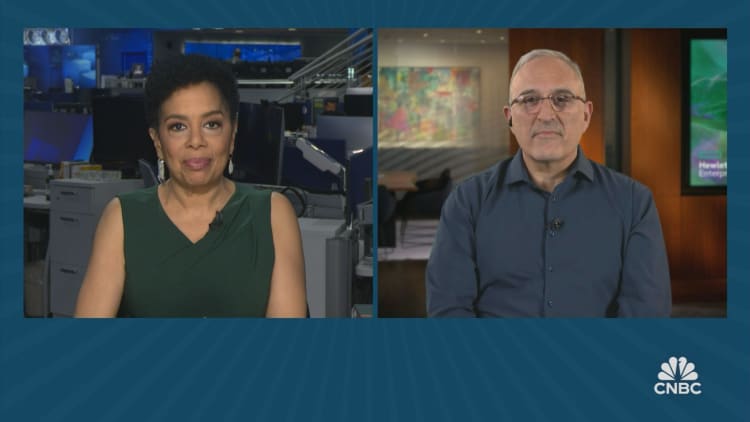
DEI is on the defensive, from the corporate world where budget cuts have hit diversity, equity and inclusion programs hard, to the world of politics, including this week's law passed in Alabama to cut off public support for DEI efforts in schools and universities.
For Antonio Neri, CEO of Hewlett Packard Enterprise, there is no backtracking on DEI commitments, but there are significant issues within corporate culture to overcome if DEI is to continue its progress. "The frozen mindset" of middle managers, as Neri referred to it, is one.
The risk, or fear, of uncomfortable conversations occurring between managers and employees remains an impediment to what has been a C-suite focus on DEI filtering down throughout all levels of an organization.
"I refer to these as the frozen mindset," Neri said during an interview with CNBC's Sharon Epperson at the virtual Equity & Opportunity Forum on Thursday. "Kind of the middle of the company. Ultimately, it is not because they don't want to help. It's just they don't know how to do it. And sometimes we as human beings, we have a hard time asking for help."
While some C-suite leaders may talk the talk without walking it, Neri says he started with himself. When he became CEO of the 62,000-employee, Fortune 500 company in 2018, there was not a single woman among his direct reports.
"The first day, I have no women in my staff, no women," Neri said. "And today, 50% of my direct reports are women. Incredible, smart, brilliant, fun to be around women, and our board is the same. ... For me, it's all about the will to change, the will to do things that are hard to do honestly, and as we think about tech, potentially a little bit harder."
"We've tried to strike from the top and then as more people have kind of endorsed that point of view, it becomes a self-sustaining company," Neri said.
HPE was earlier this year named the No. 1 company on the annual Just 100 list of top large corporate employers, and ranked No. 32 on the Fortune 100 Best Companies to Work For list in 2023.
Neri says recognizing there was an issue within the company forced him to have uncomfortable conversations. He described the initial stages of the DEI efforts his leadership has put in place as "a little bit difficult," specifically citing the Covid period and George Floyd protests, and working with a Black female member of HPE's board. "It was a real emotional moment, in the height of the pandemic," he said.
HPE has established internal programs to provide training to managers and employees to have those "sometimes difficult conversations," Neri said, and added that the company, "had to make a significant adjustment to really listen to the employees' feedback, and then implement programs that ultimately addressed the top of mind concerns."
There are signs of progress in more managers now coming forward and taking a leadership position, Neri says, but he added, "We're far from done, to be honest with you."
Neri says his attention to the difficulties managers and employees facing in having these initial conversations is informed by his personal story: he comes from a Sicilian family which immigrated to Argentina, joined the company in 1995 as a call center agent, learned English as a third language, and worked in a group covering "21 languages, every race, every ethnicity, every culture."
"I take it with me everywhere I go. For me, it's kind of part of who I am. And therefore it is very natural for me to have this type of conversation with my employees and with my managers," he said. "You know, if you're not vulnerable, you're not learning. So being uncomfortable is part of your growing journey. I attended more than 20 listening sessions and the only thing I did was just listen, and that's the first step."
Neri also believes that compensation should be tied to DEI accountability in multiple ways. "I don't believe in hard quotas ... but I do believe that a percentage of your compensation should be tied to advancing talent. And then in the advancement of the talent to address these issues," Neri said. The company has also tracked the data on pay equity across its regions, and in markets including the U.S., UK, and India, Neri told Epperson he "can confidently say" women earn the same dollar-for-dollar pay as men.
Public trust is at a low, across leaders in politics, law, corporations and the media, and Neri says the lack of trust is a reason to be more open about these issues. "This is an area where actually we have to be more transparent than ever. When I talk to my employees, which are more than 60,000, what they really value is the clear communication ... how you communicate, how you engage, how you deal with the issues and be upfront about those issues, and in some cases, involve them in helping us find solutions."
Many companies are now more hesitant to use acronyms like ESG and DEI, and from at least one perspective, Neri said he agrees with this growing reluctance to pursue the goals on these acronymic terms. "If you have a rational logical conversation with individuals about advancement of people, of course everybody wants to make sure everybody has an opportunity. When you think about the ability to be inclusive, you know, and have an opinion that you can share with others, generally, most people will say yes, absolutely. We want that. And so it's less about the acronym 'DEI' and more about having the real conversation. ... So let's step back out of these acronym things and think about the actual conversations we need to have."
To join the CNBC Workforce Executive Council, apply at cnbccouncils.com/wec.







